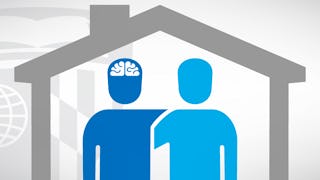The course "Learning from the experiences of caregivers in chronic conditions" is designed for individuals who care for people with chronic illnesses—whether they are family members, healthcare professionals, or individuals interested in enhancing their skills to provide comprehensive, high-quality care. With a practical and contextualized approach, participants will gain essential tools to identify warning signs, understand the emotional and physical impact of their role, and develop effective self-care strategies. This improves their well-being and enhances the patient's quality of life.

Enjoy unlimited growth with a year of Coursera Plus for $199 (regularly $399). Save now.

Learning from the experiences of caregivers with chronic conditions


Instructors: Sonia Patricia Carreño Moreno
Included with
What you'll learn
The participant will learn to identify and analyze warning signs in the care of individuals with chronic conditions.
The participant will develop the skills to tackle complex issues and propose effective solutions
The participant will enhance their personal well-being by acquiring self-care strategies applicable to their role
Skills you'll gain
Details to know

Add to your LinkedIn profile
See how employees at top companies are mastering in-demand skills

There are 3 modules in this course
In the course entitled "Learning to be Caregivers for Patients with Chronic Conditions," participants acquired essential knowledge and skills necessary for effective caregiver support. In this new course, the objective is to apply the insights gained through case analysis to identify warning signs, comprehend the ramifications of assuming the caregiver role, and recognize potential strategies for implementation. Topics to be addressed encompass the distinctions between caregiving for acute and chronic health conditions (Unit 2 - Course Learning to be Caregivers for Patients with Chronic Conditions), the implications of the caregiving burden associated with chronic conditions, and the effects on the caregiver resulting from this burden, as well as the unforeseen assumption of caregiving responsibilities without adequate preparation. The competencies that will be enhanced include critical thinking and complex situational analysis. I look forward to our continued exploration together!
What's included
2 videos3 readings2 assignments1 peer review1 discussion prompt
During the development of the first unit, knowledge was applied about the impacts arising from the caregiving burden in chronic health conditions was applied. This included identifying warning signs and underscoring the significance of transitioning from the imposition phase to the organization phase of the caregiving role. In the subsequent unit, the objective is to delve deeper into the caregiver-patient dyad and examine how caregivers can progress towards organizing their roles to enhance their quality of life and optimize their caregiving tasks. It is important to utilize the educational resources provided in the course "Learning to Be a Caregiver for People with Chronic Conditions" to solidify the knowledge acquired and apply it effectively. The topics to be explored include Afaf Meleis’ transitions theory, the importance of emotional and practical support, the caregiver-patient dyad in chronic health conditions, caregiver overload, and role organization. The skills to be developed encompass critical thinking, analytical reasoning, complex situation analysis, and problem-solving. We shall advance to uncover the various components that this module has to offer offer!
What's included
1 video5 readings4 assignments1 discussion prompt
In light of the development of the course entitled "Learning from the Experiences of Chronic Condition Caregivers," and following an analysis of the effects associated with caregiving for individuals with chronic health conditions, as well as a review of potential strategies to enhance quality of life and promote healthy role adoption, this third module is designed to identify the essential skills requisite for caregivers to effectively manage the burdens and impacts associated with their responsibilities. It is important to note that the educational resources from the course "Learning to be a Caregiver for People with Chronic Conditions" may serve as valuable tools for recognizing the knowledge that has been acquired and its significance application. Topics to Cover: • Caregiver Burden and Overload • Levels of Caregiver Role Adoption • Cognitive and Instrumental Skills of Caregivers Skills to Develop: • Critical Thinking • Complex Situational Analysis • Problem Solving
What's included
3 videos1 reading3 assignments1 peer review1 discussion prompt
Offered by
Explore more from Patient Care
 Status: Preview
Status: PreviewUniversidad Nacional de Colombia
- Status: Preview
University of Minnesota
 Status: Free Trial
Status: Free TrialStanford University
 Status: Preview
Status: PreviewJohns Hopkins University
Why people choose Coursera for their career




Frequently asked questions
To access the course materials, assignments and to earn a Certificate, you will need to purchase the Certificate experience when you enroll in a course. You can try a Free Trial instead, or apply for Financial Aid. The course may offer 'Full Course, No Certificate' instead. This option lets you see all course materials, submit required assessments, and get a final grade. This also means that you will not be able to purchase a Certificate experience.
When you purchase a Certificate you get access to all course materials, including graded assignments. Upon completing the course, your electronic Certificate will be added to your Accomplishments page - from there, you can print your Certificate or add it to your LinkedIn profile.
Yes. In select learning programs, you can apply for financial aid or a scholarship if you can’t afford the enrollment fee. If fin aid or scholarship is available for your learning program selection, you’ll find a link to apply on the description page.
More questions
Financial aid available,
¹ Some assignments in this course are AI-graded. For these assignments, your data will be used in accordance with Coursera's Privacy Notice.






